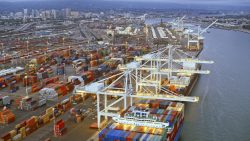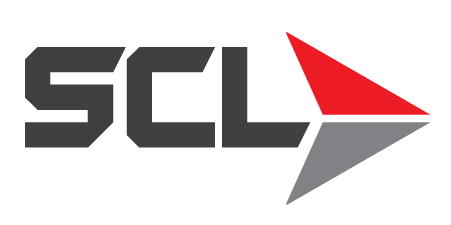The Future of Shipping: Zero Emissions to Expanding “America’s Port”

How Infrastructure Needs in Los Angeles, Long Beach Tie in to Biden’s Goals
The shipping industry has faced hurdle after hurdle since the onset of COVID-19, from disruptions to supply chains that impacted companies worldwide to delays at “America’s Port” in Los Angeles and the Port of Long Beach, where ships are experiencing unprecedented down time brought on in part by a spike in pandemic-related consumer purchases.
Now, as the Biden Administration works to gather support for its infrastructure bill calling for the International Maritime Organization (IMO) to reach net zero emissions by 2050, the future of shipping is one undoubtedly marked by change.
Here are a few issues the industry is currently experiencing and what our customers in shipping can expect in the years to come:
Delays + Needs at California Ports
President Joe Biden’s $2.25 trillion infrastructure proposal, dubbed the “American Jobs Plan,” has yet to receive enough bipartisan support to pass the House of Representatives.
And while negotiations among lawmakers have already dropped the price tag to $1.7 million through reductions in scope and a search for alternative funding sources, its future is still uncertain.
From the start, the main sticking point for Republican leaders has been the bill’s definition of “infrastructure,” with many stating Medicaid and other Democrat-led initiatives should not fall under that parameter. Regardless, however, most agree improvements to infrastructure – especially those at the nation’s leader ports – are needed.
According to American Shipper, Port of Long Beach (POLB) Executive Director Mario Cordero recently said the issue of funding was ultimately up to Congress, but specific improvements need to be made to maintain competitiveness on a global scale. Without the bandwidth to “match the ability of consumers to buy online 24/7,” the American shipping industry will fail to keep up with its international counterparts.
For Cordero and other leaders – including Port Tampa Bay President and CEO Paul Anderson – shortfalls include a lack of containers, intermodal chassis, and on-dock rail capacity, as well as trucks and rail to move goods in a timely manner once they are unloaded.
The POLB and the Port of Los Angeles (POLA) are currently experiencing unprecedented back up due to the issues outlined by Cordero, as well as spikes in pandemic-related consumer purchases that have increased imports from international manufacturers in China, Hong Kong, Japan, Vietnam and Taiwan. Thanks to American purchases of everything from refrigerators to shoes, imports outnumber exports 4.3 to 1.
The nation’s largest port, POLA “handled 37.4% more shipping containers in April 2021 than a year earlier, making it the busiest April in its 114-year history.” Experts are predicting a 53% increase in May and a 21% increase in June, which they say will add to the already congested port, where ships are anchoring for longer periods of time as port workers scramble to unload and find empty shipping containers.
In addition to operational delays, the backlog has led to dramatic increase in idling among both ships and trucks, which in turn has led to increases in carbon emissions.
Drive for Zero Emissions
In April, the Biden Administration put those carbon emissions in its cross hairs by stating it would push the IMO to adopt zero emissions by 2050. The goal, announced by Special Presidential Envoy to Climate John Kerry as part of the Leaders Summit on Climate Change in April 2021, would require the industry to reduce emissions by 50% compared to 2008 levels.
POLA – dubbed “America’s Port – handles about 20% of all imports in the United States and employs over 529,000 people. As of May 2016, it had already surpassed initial 2023 emission goals 8 years ahead of time, dramatically reducing emissions in diesel particulate matter by 72%, sulfur oxides by 93%, and nitrogen oxide by 22%.
A study released in August 2020 showed carbon emissions from shipping accounted for 2.89% of the world’s total CO2 emissions in 2018, an increase from 2.76% in 2012 when the last study period ended.
Submitted as a bullet point on a White House Fact Sheet, the administration also stated more than 85% of carbon emissions come from countries outside of the United States.
According to the fact sheet:
The international shipping sector contributes approximately 3% of global greenhouse gas emissions, and the sector’s emissions are only projected to increase. In support of the global effort to keep within reach a 1.5 degree C limit on global average temperature increase, and in support of global efforts to achieve net-zero GHG emissions no later than 2050, the United States is committing to work with countries in IMO to adopt a goal of achieving zero emissions from international shipping by 2050 and to adopt ambitious measures that will place the sector on a pathway to achieve this goal.
Measures specific to the shipping industry and the IMO are not detailed in the report.
The Bottom Line
Although infrastructure improvements are greatly needed at California’s ports, consistently ranked in the country’s top five facilities, it remains to be seen how the shipping industry on the whole can move toward net zero emissions.
“With the amount of cargo that comes through California ports, SCL and our customers have a vested interest in the performance of those ports and specifically their ability to move cargo into this country where fleets move goods to stores and consumers,” said SCL General Manager Travis Becktel. “With consumer demand for goods projected to skyrocket, short- and long-haul fleets should be making the appropriate investments today to existing and future fleets to serve, and ultimately profit from, the projected demand in goods coming through ports and elsewhere.”
Contact an SCL Consultant today
In a wide range of automotive, industrial and commercial sectors, SCL remains steadfast on its commitment to product and industry knowledge, performance satisfaction and superior logistics. We protect and optimize the machines that keep our country moving. For more information on how we help can help with services including bulk purchasing or managing inventory, contact an SCL expert today.
